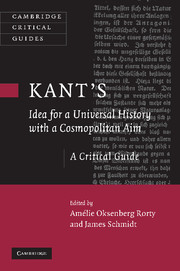Book contents
- Frontmatter
- Contents
- List of contributors
- List of abbreviations
- Introduction: history as philosophy
- Idea for a Universal History with a Cosmopolitan Aim
- 1 Teleology and history in Kant: the critical foundations of Kant's philosophy of history
- 2 The purposive development of human capacities
- 3 Reason as a species characteristic
- 4 Good out of evil: Kant and the idea of unsocial sociability
- 5 Kant's Fourth Proposition: the unsociable sociability of human nature
- 6 The crooked timber of mankind
- 7 A habitat for humanity
- 8 Kant's changing cosmopolitanism
- 9 The hidden plan of nature
- 10 Providence as progress: Kant's variations on a tale of origins
- 11 Norms, facts, and the philosophy of history
- 12 Philosophy helps history
- Bibliography
- Index of names and works
7 - A habitat for humanity
Published online by Cambridge University Press: 28 July 2009
- Frontmatter
- Contents
- List of contributors
- List of abbreviations
- Introduction: history as philosophy
- Idea for a Universal History with a Cosmopolitan Aim
- 1 Teleology and history in Kant: the critical foundations of Kant's philosophy of history
- 2 The purposive development of human capacities
- 3 Reason as a species characteristic
- 4 Good out of evil: Kant and the idea of unsocial sociability
- 5 Kant's Fourth Proposition: the unsociable sociability of human nature
- 6 The crooked timber of mankind
- 7 A habitat for humanity
- 8 Kant's changing cosmopolitanism
- 9 The hidden plan of nature
- 10 Providence as progress: Kant's variations on a tale of origins
- 11 Norms, facts, and the philosophy of history
- 12 Philosophy helps history
- Bibliography
- Index of names and works
Summary
Of the many puzzling elements in Kant's Idea for a Universal History (hereafter the Idea), one that has seemed to me most puzzling, and in some ways most provocative, is its effacement of the individual moral agent. Persons are around in the story, most often as the vehicles for envy and greed, or the other aspects of human unsocial sociability. But the sincerely good person, careful and thoughtful in ends and deeds, might as well not bother, at least not from the point of view of the questions that the Idea is about (and then also, perhaps, from the point of view of human history). In the post-Hegelian world-view, that may seem right. But in Kant's philosophical voice, it is jarring.
A related source of puzzlement concerns the intended audience for the Idea. There is some reason to think it is Frederick the Great (the tone of the remarks in the Ninth Proposition suggests a worldly advisor whispering in the king's ear about honor and posterity). In “What is Enlightenment?” Kant made a plea for the protection of freedom of the press as necessary for the liberation of human rational powers; in the Idea there is something like a plea for the end of war-making in order to liberate resources for the education and culture of citizens. But the Idea doesn't read like an argument for princes, and it is not entirely clear that Kant regards peace, as he does freedom of thought and expression, as a possible aim of public policy (as opposed to something one hopes for and should not impede).
- Type
- Chapter
- Information
- Kant's Idea for a Universal History with a Cosmopolitan Aim , pp. 150 - 170Publisher: Cambridge University PressPrint publication year: 2009
- 5
- Cited by



